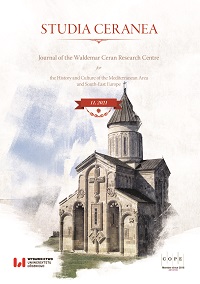Christian Heretical Participation in the Rebellion of Börklüce Mustafa and Sheikh Bedreddin – Reappraising the Evidence
Christian Heretical Participation in the Rebellion of Börklüce Mustafa and Sheikh Bedreddin – Reappraising the Evidence
Author(s): Yuri StoyanovSubject(s): History, Middle Ages, Theology and Religion
Published by: Wydawnictwo Uniwersytetu Łódzkiego
Keywords: Islamic-Christian relations; syncretism; heresy;, Christian dualism; Ottomans; Byzantium; apocalypticism; social movements and rebellions
Summary/Abstract: The outbreak and Balkan and Anatolian trajectories of the rebellions of Borkluce Mustafa and Sheikh Bedreddin in 1416 still pose a series of religio-historic problems which still do not allow a satisfactory and detailed reconstruction of their chronology. Widening the investigation of the source base for these uprisings and their following remains a crucial desideratum for a better understanding of the turbulent period of the Ottoman interregnum and the Ottoman-Byzantine transition in eastern Anatolia in the early fifteenth century. Apart from the social and political features of the rebellions (which have been treated in a variety of contrasting ideological and methodological frameworks, their striking religious dimension has been also increasingly attracting scholarly and general attention. Earlier and recent research on the Ottoman interregnum period have occasionally advanced arguments for the active participation of Christian heretical groups, whether Christian dualist (Bogomil or Paulician) or radical apocalyptic insurgents of Eastern or Western Christian provenance. Drawing on new advances in research on religious trends in the late Byzantine and Balkan Orthodox and early Ottoman religious life and inter-religious contacts, the paper will offer an reassessment of the evidence of such proposed Christian heretical presence in the uprisings, while also exploring other venues for the provenance of their religious and trans-confessional underpinnings.
- Issue Year: 2021
- Issue No: 11
- Page Range: 443-461
- Page Count: 19
- Language: English

